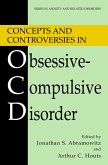Obsessive-Compulsive Disorder (OCD) is one of the most common of the emotional disorders. It involves habitual, repetitive behaviours that can be bizarre, disruptive and eventually disabling, which can destroy lives and relationships. Ross Menzies and Padmal de Silva have brought together recognised international leaders in the field to provide an overview of current advances in knowledge, theory, assessment and treatment of OCD. Set out in five sections, the first explores the nature of OCD providing a solid foundation for the sections to follow. The second considers various conceptual and theoretical aspects of the disorder, including neuropsychological and cognitive models, individual differences and biological factors. The third section describes clinical presentations and subtypes, including washing and cleaning, checking, hoarding, slowness, atypical presentations, and the spectrum disorders. Assessment and treatment are dealt with extensively in the fourth section, providing a thorough review of all available treatments with known efficacy, including Exposure and Response Prevention (ERP), Danger Ideation Reduction Therapy (DIRT) and pharmacological interventions. Particular emphasis is given to treatment of complex and treatment-resistant cases. The final section concerns professional issues, such as training, resources and service provision. This comprehensive but concise volume will provide practical guidance for trainees, as well as established practitioners in clinical psychology, psychiatry, and related disciplines such as mental health nursing, counselling and therapy.
Hinweis: Dieser Artikel kann nur an eine deutsche Lieferadresse ausgeliefert werden.
Hinweis: Dieser Artikel kann nur an eine deutsche Lieferadresse ausgeliefert werden.
"...a succinct yet broad view of OCD...the scope of the book is wide..." (British Journal of Psychiatry, Dec 2003)
"...differences and similarities of every manifestation of the disorder are carefully explained...information is presented unsensationally and respectfully..." (Mental Health Today, Feb 2004)
"...differences and similarities of every manifestation of the disorder are carefully explained...information is presented unsensationally and respectfully..." (Mental Health Today, Feb 2004)








